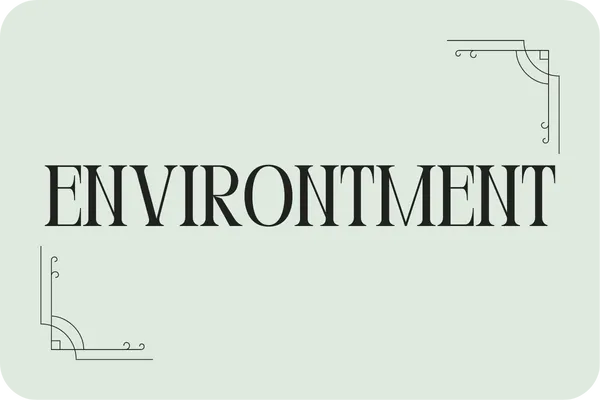
The Human Design Blog ✨
I wanna read about...

Beginners Guide to Human Design - Environment
“The six environments – Caves, Markets, Kitchens, Valleys, Mountains, and Shores – are the theaters of our lives. Each of us is designed to thrive in our unique stage.” - Ra Uru Hu
Table of Contents
Introduction to Human Design and Environment
Brief Overview of Human Design
Definition and Importance of Environment in Human Design
Diving Deeper into the Environment Concept
Understanding the Role of Environment in Human Design
The Six Different Environments
Caves
Markets
Kitchens
Mountains
Valleys
Shores
How Environments Affect Us
Effect on Behavior and Personality
Effect on Health and Well-being
Determining Your Environment Type
Decoding Your BodyGraph
Aligning with Your Environment Type
Tips to Adjust Your Living and Working Spaces
Conclusion
FAQs

Beginners Guide to Human Design: Understanding Environments
Introduction to Human Design and Environment
Brief Overview of Human Design
Human Design is a revolutionary system that offers insights into our true nature, behaviors, and potential. It combines elements from astrology, the I Ching, Kabbalah, and the chakras, providing a unique and comprehensive view of the human experience.
Definition and Importance of Environment in Human Design
In the context of Human Design, the 'Environment' is a significant aspect. It refers to the spaces and surroundings we occupy, such as our homes, workplaces, or even cities. These environments hold a distinct energy that interacts with our personal energy, influencing our experiences and well-being.
Diving Deeper into the Environment Concept
Understanding the Role of Environment in Human Design
In Human Design, our environment plays a pivotal role. It's not just about where we are physically; it's about the energy of the place and how that energy interacts with ours. This interaction can impact our health, mood, and overall life quality.
The Six Different Environments
In Human Design, there are six recognized environments, each carrying a unique energy.
Caves
'Cave' environments symbolize privacy, protection, and introspection. They are ideal for those who need a quiet and personal space to thrive. These individuals often prefer living in smaller, cozier spaces where they can control their environment.
Markets
Unlike cave-dwellers, individuals who resonate with the 'Market' environment thrive in bustling, vibrant spaces. These social beings often seek stimulation and enjoy being part of a lively community.
Kitchens
The 'Kitchen' environment denotes nourishment, both physical and emotional. Those resonating with this environment type might find joy in creating, cooking, and nurturing others. Home spaces with an open kitchen or community spaces with food and warmth are their ideal locations.
Mountains
Those who resonate with 'Mountain' environments seek perspective and solitude. High altitudes or places offering broad, expansive views can be invigorating for these individuals, helping them gain clarity and inspiration.
Valleys
The 'Valley' environment signifies community and interaction. Those who resonate with this type are often social, enjoying the company of others. Living in close-knit communities or busy neighborhoods might be beneficial for them.
Shores
The 'Shore' environment represents transition and fluidity. Those resonating with this type might find themselves drawn to places where land meets water, symbolizing the merging of different states of being.
How Environments Affect Us
Effect on Behavior and Personality
Your environment can significantly influence your behavior and personality. Being in a place that resonates with your energy can help you express your true self, while a mismatched environment might lead to discomfort or restlessness.
Effect on Health and Well-being
Similarly, the environment also impacts your physical health and well-being. A harmonious environment can boost your vitality, whereas an unsuitable one can cause stress, fatigue, or illness.
Determining Your Environment Type
Determining your environment type requires a detailed understanding of your Human Design body graph, which can be generated with your birth data.
Aligning with Your Environment Type
Tips to Adjust Your Living and Working Spaces
Once you identify your environment type, you can adjust your living and working spaces accordingly. This could mean decluttering, adding specific elements, or even changing your location to align better with your personal energy.
Conclusion
Understanding your environment type in Human Design offers valuable insights into enhancing your well-being, creativity, and overall life quality.
FAQs
1. What is Environment in Human Design?
In Human Design, the 'Environment' refers to the physical and energetic spaces we occupy, significantly impacting our well-being and experiences.
2. What are the six environments in Human Design?
Human Design recognizes six environments - Caves, Markets, Kitchens, Mountains, Valleys, and Shores. Each carries a unique energy that interacts with our personal energy.
3. How does the environment affect us in Human Design?
In Human Design, the environment can significantly influence our behavior, personality, health, and well-being. A harmonious environment helps us thrive, while a mismatched one could cause discomfort or illness.
4. How can I determine my environment type?
You can determine your environment type through your Human Design body graph, which requires your birth data. - Signup in the below to get your starter kit and your free chart.
5. How can I align with my environment type?
Once you understand your environment type, you can align your living and working spaces accordingly to harmonize with your personal energy and enhance your well-being.
“Just like a flower that blooms best in its native soil, understanding your correct environment – whether it's the Shore or the Mountain, the Cave or the Kitchen, the Market or the Valley – brings out your fullest potential.” - Ra Uru Hu


